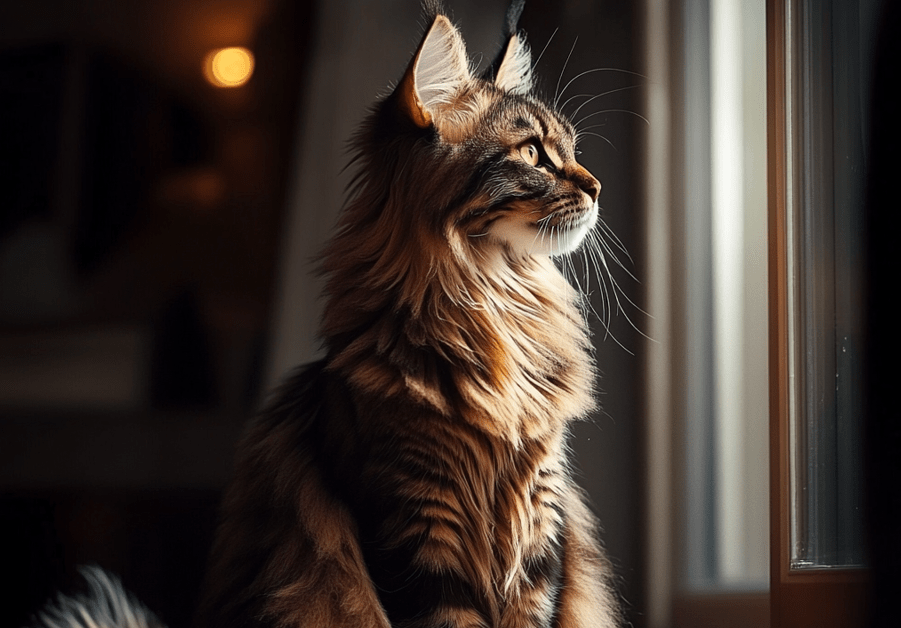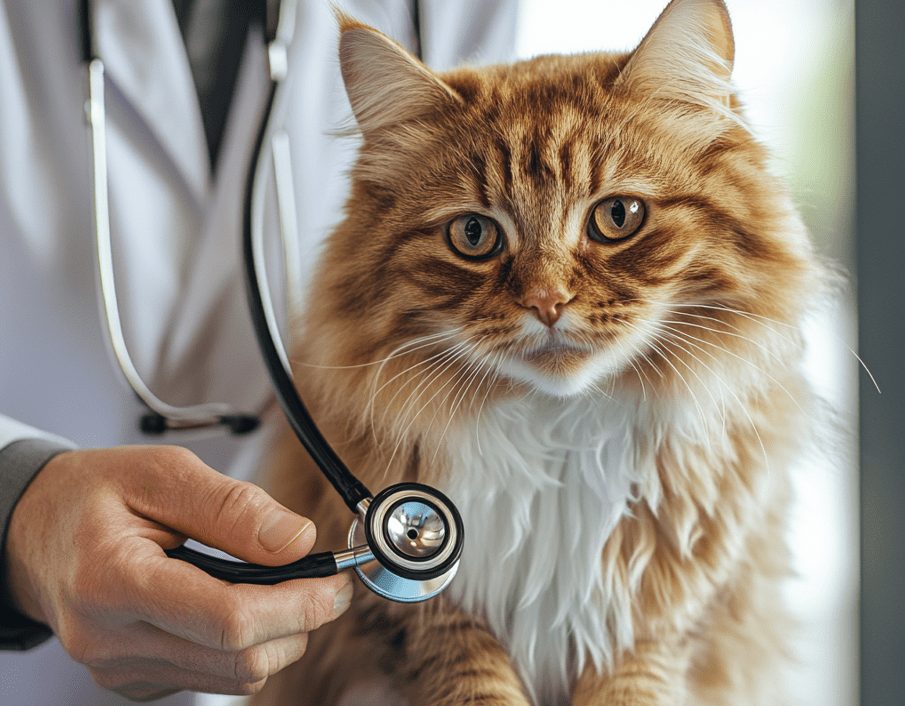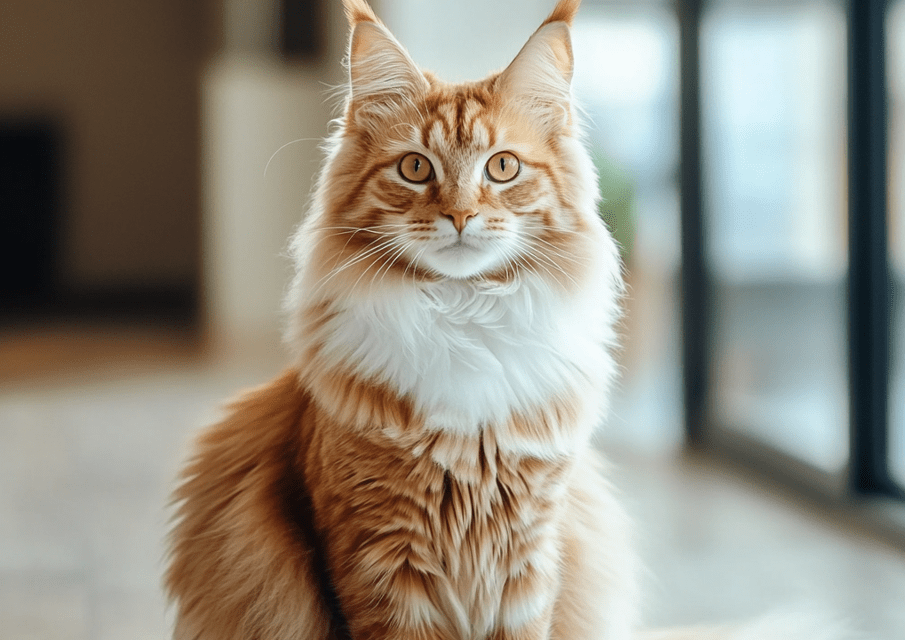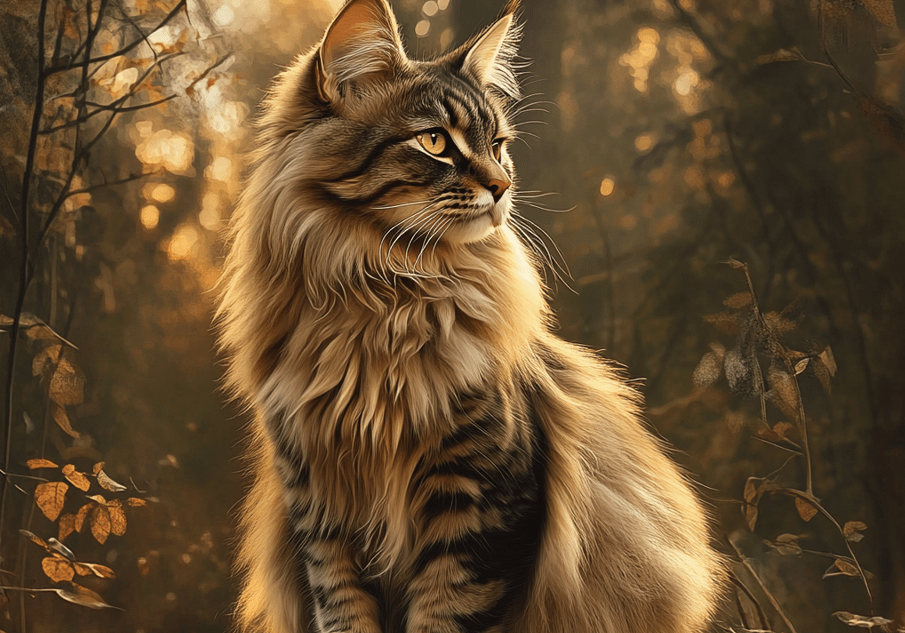
Maine Coon Cat Overview
One of the most impressive and distinguished cat breeds, the Maine Coon is known as one of the largest domesticated cat breeds. When exploring large and majestic cat breeds, two of the most popular choices are the Maine Coon or Ragdoll. Maine Coons are well suited to the harsh, cold winters of Maine in the USA due to their double-length, thick coat. Along with their physical characteristics, Maine Coons are known for their uniquely “dog-like” personality.
Sometimes referred to as “gentle giants,” Maine Coons are beloved for their friendly, social personality, as well as their very large size. They are known for their friendly disposition and playful nature, making them great family companions and suitable for active homes. To keep their luxurious coat soft and shiny, they must be groomed regularly.
Maine Coons are a Native American breed and live up to 10-13 years, but many individuals live even longer.
Find out all about this gentle giant of the cat world in our comprehensive Maine Coon Cat Breed Profile.
Maine Coon Cat Profile for Pet Owners
Understanding the Maine Coon cat profile is essential for potential pet owners seeking a loyal, intelligent, and playful companion. Known for their robust health, sociable nature, and adaptability to diverse environments, Maine Coons excel in both single-person homes and bustling family households. Their gentle temperament and tendency to form strong bonds with humans make them a favorite among cat enthusiasts. Whether you’re a first-time owner or an experienced cat parent, getting familiar with this breed’s behavioral traits and lifestyle needs helps ensure a harmonious pet-human relationship.
Maine Coon Cat Breed At a Glance
Origin: Maine, United States
Size: Female Maine Coons usually reach a height between 8–14 inches (20.32–35.56 cm) tall, and males reach 10–16 inches (25.5–40.64 cm).
Physical Traits: You’ll recognize this breed by its semi-longhaired coat, tufted ears, bushy tail and fur-lined paws.
Lifespan: 9–15 years
Weight: 4.8–8.2 kg
Coat Colors: Gold, silver, white and tortoiseshell
Grooming Needs: Few, but should be brushed and washed regularly.
Breed History and Origin
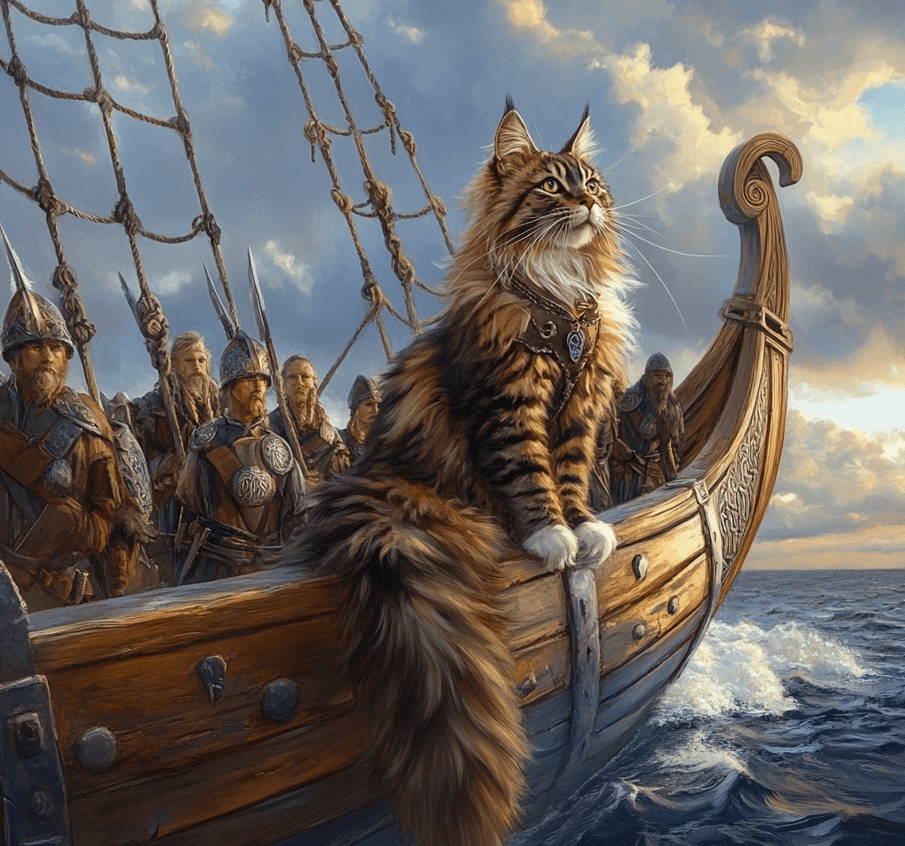
The history of the Maine Coon is filled with stories and even myths making this breed even more fascinating. Some cat enthusiasts even refer to the Ragdoll Maine Coon as a hybrid due to their similar physical traits and gentle personalities. While they are originated in Maine in the United States, some legend provides a different implication. One story has it that they descended from Angora cats that belonged to Marie Antoinette, while another has Vikings bringing long-haired cats to America, resulting in the Maine Coon breed. There is also a story that the breed was named after a British sailor, Captain Charles Coon, who took long-haired cats with him on his ship when he sailed around New England.
Genetic research suggests that the Maine Coon may be related to the Norwegian Forest Cat and a now-extinct domestic cat, and that makes the Viking theory more believable. Maine Coons are occasionally crossed with breeds such as the Ragdoll, Bengal, Siamese, Persian and Norwegian Forest Cat.
Deep Dive into the Maine Coon Breed Profile
When exploring the Maine Coon breed profile, it becomes clear why they’ve earned legendary status among feline aficionados. Their lineage traces back to New England, with myths linking them to Norse sailors and French royalty. Today, they’re cherished for their adaptability, intelligence, and hypoallergenic potential, thanks to lower levels of Fel d 1 protein in some individuals. These cats thrive on interaction, regular grooming, and structured play, making them perfect for dynamic households with time to engage in routine care and bonding.
Key Characteristics of the Maine Coon Cat Breed
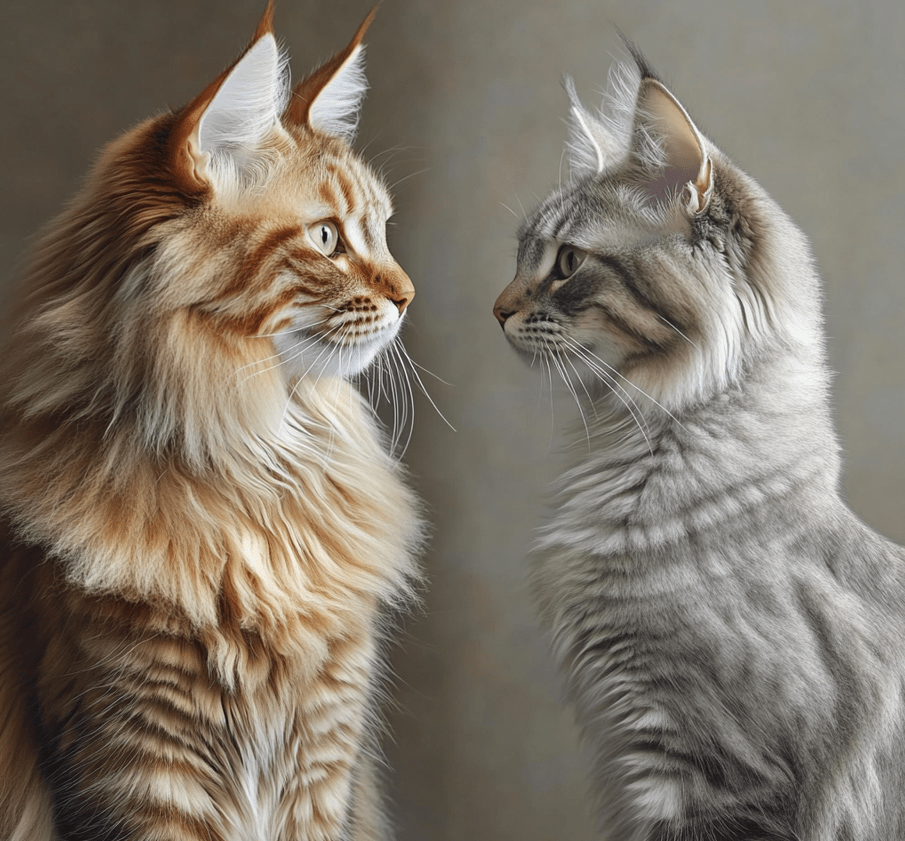
Maine Coons are large felines with lovely temperaments. For those trying to choose between a Maine Coon and Ragdoll, the Ragdoll vs Maine Coon comparison can help clarify which breed fits your lifestyle better. The Maine Coon Ragdoll cat is a rare and fascinating combination of these two well-loved breeds, often blending the physical traits of both. Many people often wonder about the differences between the Maine Coon vs Ragdoll, especially when it comes to personality and care requirements. They are known for their intelligence and energetic nature. They have tufted ears and paws, thick fur coats and very long, fluffy tails that mirror their sturdy, muscular bodies.
Their fundamental characteristics are being literally at the same time warm and loving, intellectual and interested in their environment. They generally are happy in active households because of their love for human companionship, but they can also thrive in quieter living situations.
A Comprehensive Maine Coon Profile
A detailed Maine Coon profile includes not just physical traits like their bushy tail and tufted ears but also their extraordinary emotional intelligence and vocal tendencies. These cats are known for their chirps and trills—unlike the meows of most breeds—which they use to communicate with humans. Maine Coons are also highly trainable and often enjoy activities like fetch, clicker training, and even puzzle-solving games, reinforcing their dog-like demeanor. Their curious yet calm personality suits both indoor and semi-outdoor lifestyles, provided safety is ensured.
Physical Traits of the Maine Coon Cat Breed
The Maine Coon cat is an easily recognizable breed via its size, sturdiness, and incredibly fluffy fur. The Ragdoll Maine Coon cat is an interesting hybrid that blends the physical traits of both breeds, making it even more unique. While both the Maine Coon vs Ragdoll size are large, Maine Coons tend to be slightly taller and more muscular. Female Maine Coons weigh on average up to 6 kg, while males can weigh up to 8 kg. But males can reach sizes of up to 13 kg.
Typical coat colors are brown tabby, blue, white, cream, black and orange. Gold and silver are two of the rarest and most unique coat shades.
Their ear tufts are adorable and as one of the breed’s more unique features. It is relatively unusual for a cat and adds to the overall uniqueness.
Grooming and Hygiene Needs of a Maine Coon Cat
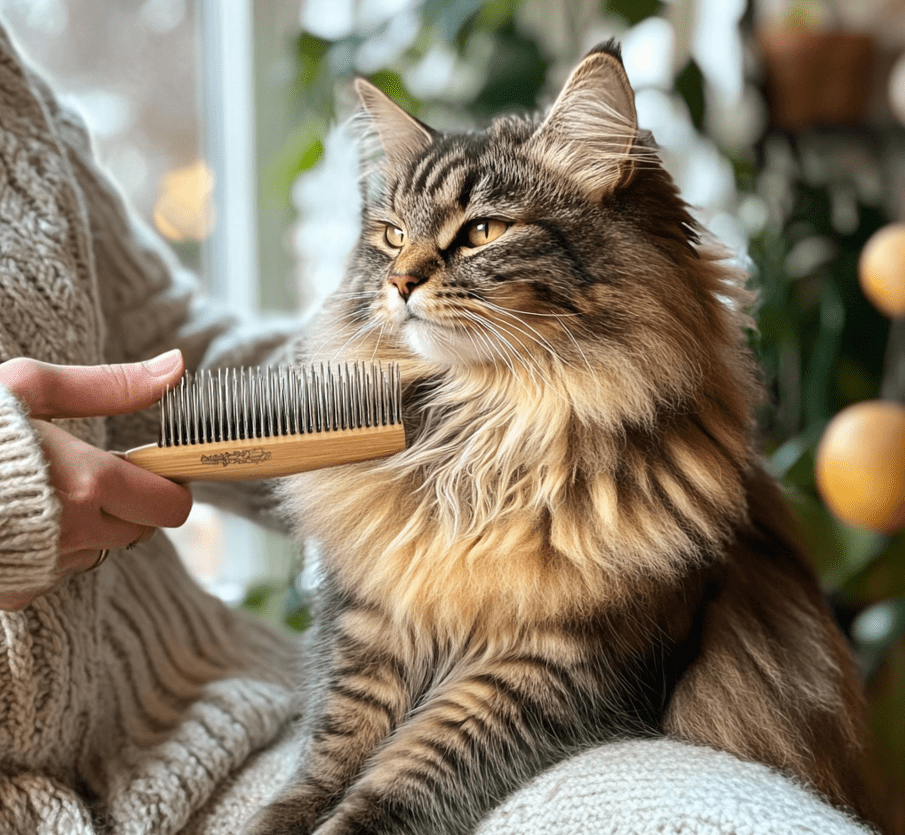
Maine Coons have a thick, dense double-coated fur suitable for keeping warm during the cold months. That dense coat needs to be groomed regularly to prevent the coat from matting. If they become matted, you may need to seek out a professional groomer. Due to the thick coat, the following at-home grooming routine should be observed:
Daily Brushing: Maine Coons have big, thick fur coats and a high-quality dual-sided metal pin brush is the best tool to smooth out the fur and get rid of dead hair and skin.
Ensure You Brush Them Well: Always start from the head and brush towards the tail and do not forget the legs and belly, as that is where the tangles are more frequent. If your cat goes outside during the winter, special care is necessary.
Bathing: You’ll need to bathe your Maine Coon only every 3 months, but in heavy-shedding season, you may need to give your cat a little extra help staying clean!
Ear Cleaning: Maine Coons may have difficulty maintaining clean ears because of their ear tufts. Gently wipe the outer ear with a warm, slightly damp cotton pad. Excess moisture should be avoided and no objects should be inserted into the ear canal to avoid irritation or injury.
Eye Cleansing: Use a soft, damp cloth or a cotton ball to wipe any discharge from your cat’s eyes so her face stays clean and free from build-up.
Nail Trimming: Regular nail trimming is required for indoor Maine Coons. You can clip their nails at home with cat nail clippers or take them to a professional groomer if your cat doesn’t cooperate.
Behavior and Training Requirements of Maine Coon Cats
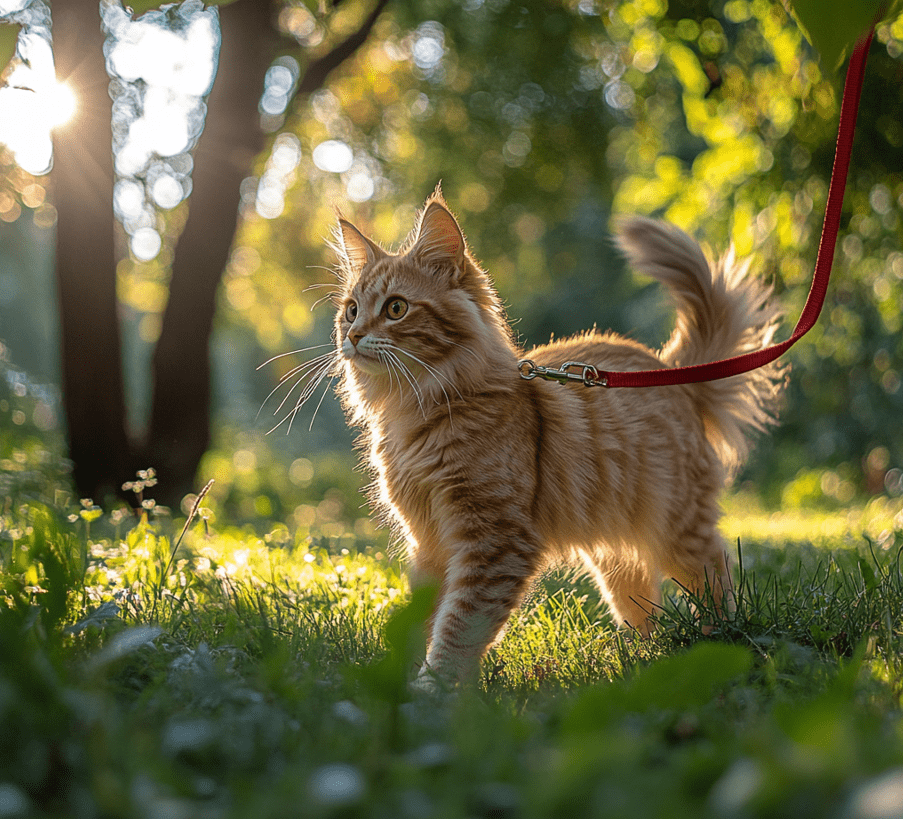
The Maine coon cat is an intelligent, well-loving, and friendly breed, so they respond well to training. When looking at the Ragdoll cat vs Maine Coon, you’ll find that both breeds share similar traits such as being affectionate, but their behavior can vary slightly. The first and the most crucial step in helping a kitten transition to a new home is litter training. This includes putting the kitten in the litter box once every 1–2 hours, gently showing them to use their paws in the litter, and giving encouraging words. Maine Coons are so smart; they usually pick up this routine quickly. In addition to litter training, owners can start leash training to help their new feline friend enjoy outdoor walks, as well as teach simple commands like sitting response using positive reinforcement methods like treats or a training clicker.
It is essential to socialize your cat from a young age to ensure that they are well-mannered and feel comfortable if visitors arrive. Things like scratching the furniture or excessive meowing should not be a problem, giving your cat scratching posts and playing with them daily with their wide assortment of toys should solve that problem.
Understanding Maine Coon Breed Characteristics
Maine Coon breed characteristics go far beyond size and appearance. They’re problem-solvers, affectionate without being clingy, and have a surprisingly high water fascination—often playing with faucets or dipping their paws in bowls. These cats adapt well to leash training and can handle changes in environment with minimal stress. Their patience and resilience also make them suitable companions for therapy work or support roles in households with special needs.
Maine Coon Cats Mental and Physical Stimulation
If you want to keep a Maine Coon entertained, you can try giving it puzzle toys with treats, building cat shelves, placing cat trees, and constructing wall-mounted climbing structures. This active breed needs regular, high-quality playtime, as they frequently retain a playful, kitten-like attitude for the entirety of their lives. Consistent mental and physical involvement is required to avoid boredom and destructive behaviors.
Nutritional Needs of Maine Coon Cats
A Maine Coon needs proper nutrition for their overall health. Choosing a reputable, high quality cat food that provides a balanced mix of fats and carbohydrates is crucial. Providing a complete and balanced, age-appropriate and lifestyle-appropriate diet including wet and dry food supports optimal weight maintenance, joint health and skin health.
Sometimes, Maine Coons do have dietary sensitivities (particularly to beef and gluten). Protein sources found in hypoallergenic diets often exclude common allergens such as beef, wheat, soy, dairy, eggs, and additives.
This was the most important part, and it is why Maine Coons make great pets. They enjoy drinking a lot of water, so you can keep them hydrated with half a liter at least, and they often prefer the running water, so they will enjoy drinking straight from the tap. By offering them both a water fountain and water bowl, you can better satisfy their needs for hydration. Moreover, wet food provides a natural method for increasing water intake.
Are Maine Coons Good Family Pets?
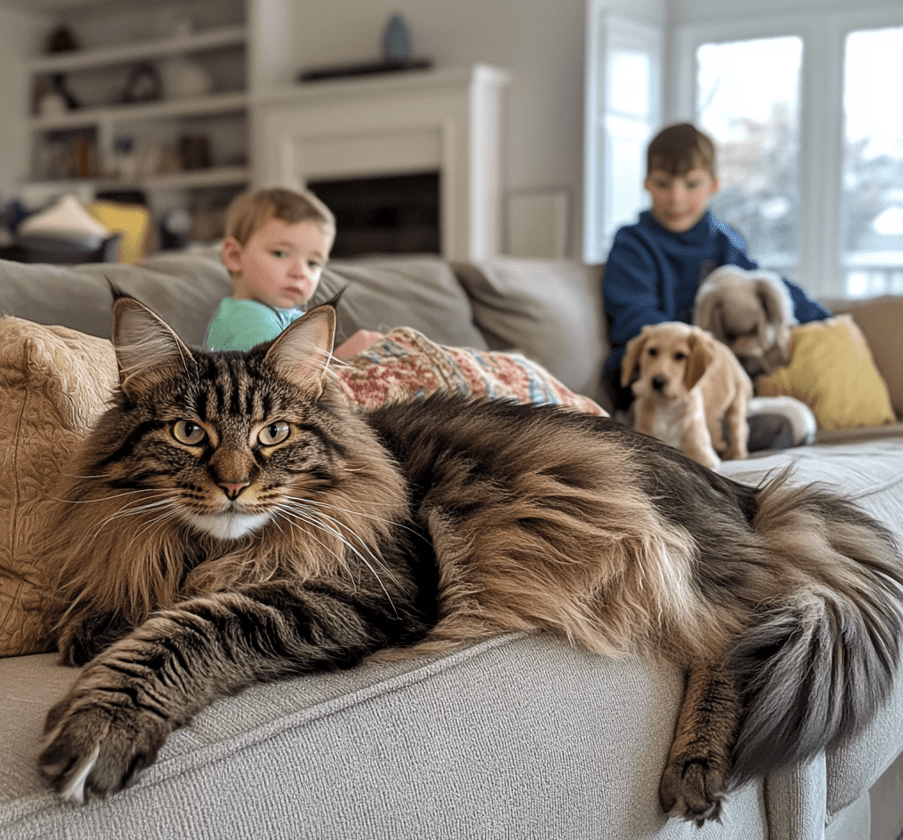
Maine Coons make great family pets because they are so sweet and gentle. The “gentle giant” is often used to describe them due to their caring and patient nature, making them good for families with children. They can easily adapt to new family members or other pets if they are properly socialized and introduced slowly. This versatile breed does well in colder climates, but also enjoys indoor life.
How to Choose a Maine Coon Breeder
It is important to choose a good breeder as they can not only support ethical breeding, but also get a healthy pet that lives a long life. When selecting Maine Coon and Ragdoll kittens, make sure the breeder provides documentation of their health and genetic testing. Caring practices and breeding is not only just better for the breed, but one would hope that responsible breeders are also looking out for their cats wellbeing. One should check the cleanliness of the kitten, the quality of its environment, and what diet it has been used to have.
Take the time to research and look for a reputable Maine Coon breeder. Seek out breeders who are well known in the Maine Coon community and ask for references from past clients. Also, request to meet the parents and ask if they have had any genetic testing and whether they have needed any vaccinations.
Expert Maine Coon Cat Breed Profile Insights
For a well-rounded understanding, this Maine Coon cat breed profile includes insight into their long-term health outlook, exercise requirements, and seasonal care routines. Owners should be prepared for seasonal shedding cycles and potential hereditary health issues like HCM (Hypertrophic Cardiomyopathy). Enrichment tools like vertical climbing trees, interactive feeders, and scent-stimulating toys can significantly enhance their quality of life. Regular vet checkups, combined with proper grooming and nutrition, can help these majestic cats live well beyond their average lifespan.
Considering Genetic Health
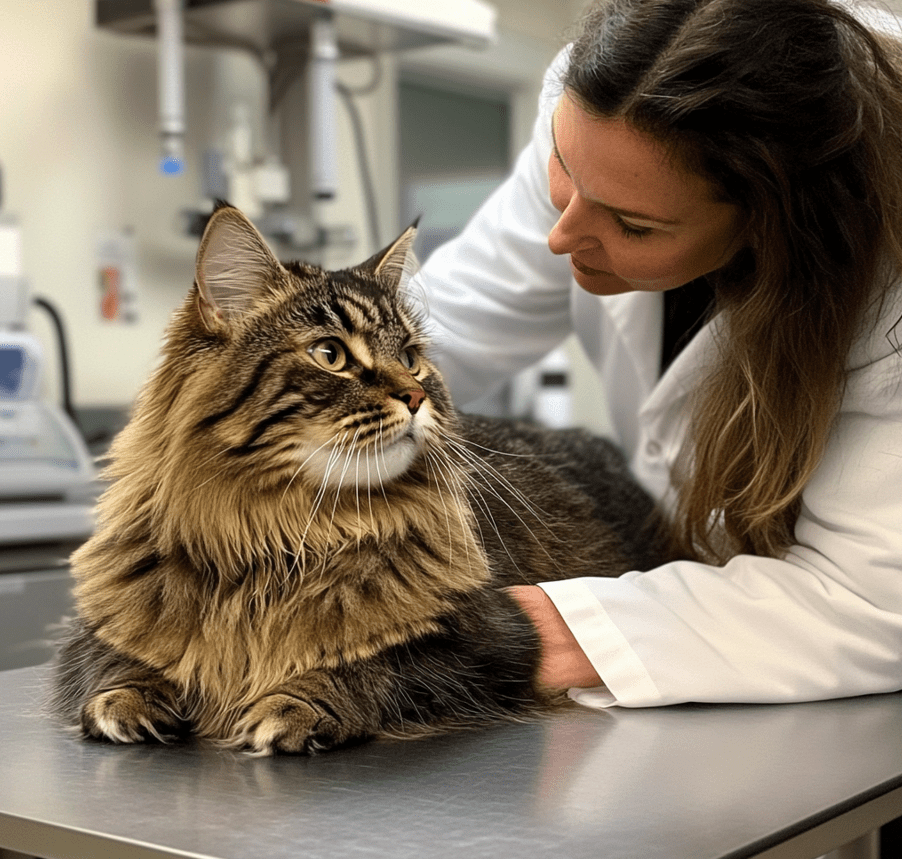
Unfortunately, Maine Coons are also prone to various genetic health conditions, just like any other breed of cat. This is why genetic testing is so important to responsible breeding. Ethical breeders will give you documentation of the kittens’ health, including any genetic testing done, to ensure your future pet’s health.

